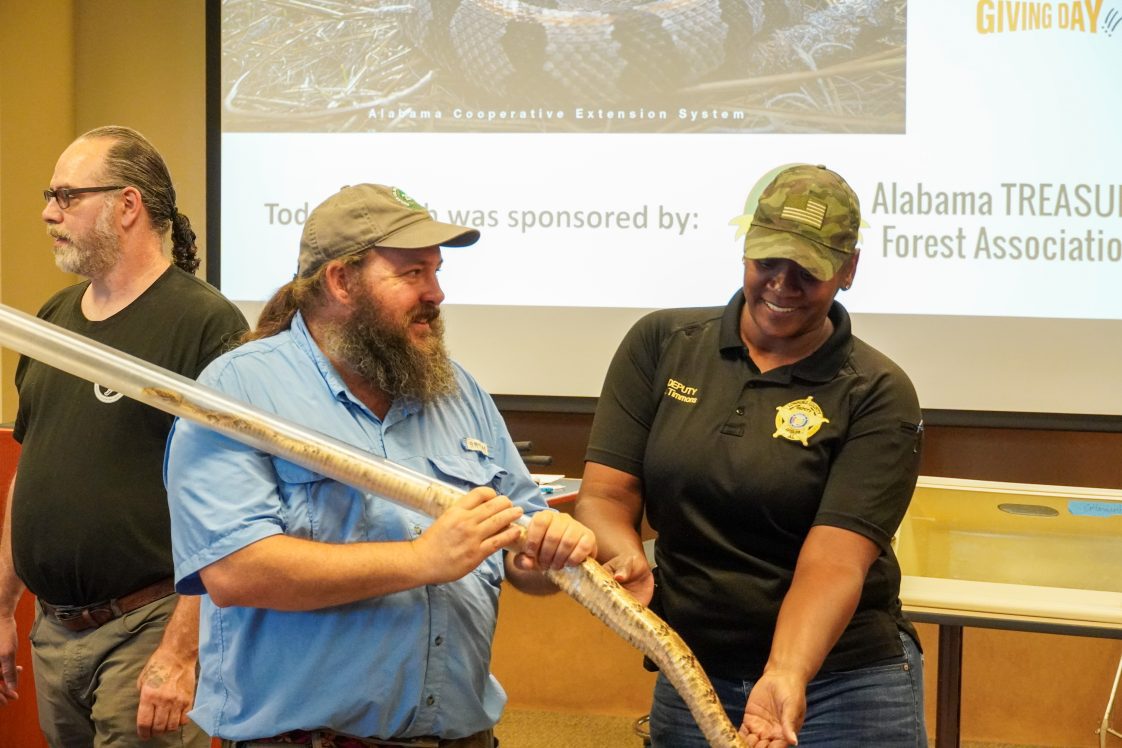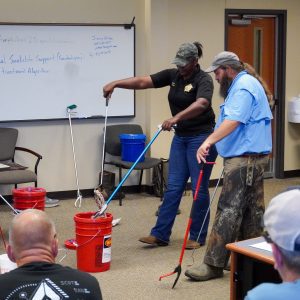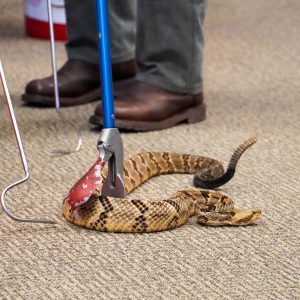Forestry & Wildlife

AUBURN UNIVERSITY, Ala. – Dozens of first responders gained valuable, lifesaving skills during Alabama Cooperative Extension System venomous snake trainings. These educational events ensure that those who are likely to respond to snake calls are prepared to identify snake species, safely handle them and react appropriately. Alabama Extension Wildlife Specialist Wesley Anderson said that fear and fascination of snakes make these workshops a tremendous success.
Why snake trainings?
According to Anderson, throughout human history, relationships with snakes have been polarizing.
“Human-snake conflicts have existed for millennia,” Anderson said. “Snakes seem to capture the public’s imagination through a combination of fear and fascination. At the same time, many people are beginning to recognize their ecological importance and requests for snake relocation (rather than extermination) have become increasingly common.”
Anderson along with Bence Carter, Alabama Extension forestry, wildlife and natural resources regional agent, teamed up to gather funding in 2023 through Auburn University’s Tiger Giving Day. This 24-hour online fundraising event provides the platform for numerous projects to be funded through generous donations.
The target audience for these trainings was first responders (police officers, EMTs, firefighters, etc.) and caregivers who might be in the position to identify and handle venomous snakes as well as treat bites in emergency situations. However, the program does not require attendees to be first responders to participate.
- Jimmy Stiles helps a first responder handle a venomous snake.
- Snake tongs were used for snake handling practice.
- Raymond Corey and Jimmy Stiles help first responders safely examine a rattlesnake.
Making an Impact
The fundraising platform was a success, raising more than $10,000 to educate Alabamians. Completely free of charge, 170 participants (including 72 first responders) learned the six venomous snake species of Alabama, how to handle them and what to do in case of a snakebite.
Continuing education units (CEUs) were awarded to first responders for completing the workshop. Seven total events were completed statewide ranging from Baldwin to Madison counties. They were instructed by Jimmy Stiles, environmental educator and current doctoral student in the Auburn University College of Forestry, Wildlife and Environment (CFWE), and Raymond Corey, environmental educator and snake expert.
Additionally, snake-handling tools such as tongs, snake hooks and lockable five-gallon buckets were also purchased for each participating Alabama Extension office. These provisions will prove useful when receiving calls about snakes and in their safe relocation efforts.
The feedback from attendees was resoundingly positive. In fact, 79% of participants indicated that their snake identification ability increased after attending the workshop. Moreover, 99% of attendees also indicated that they were “more comfortable” or “much more comfortable” when dealing with potential snake issues in the future.
Another compliment of the program included a post-event survey statement from a law enforcement officer who said it was “the best CEU I’ve been to in my lifetime.”
Continuing Education
Anderson says that the venomous snake programming will carry on in 2024.
“While impossible to quantify how much safer folks are now as a result of attending these workshops, the survey results indicate that attendees are better equipped and informed to deal with snake conflicts,” Anderson said. “This, in turn, keeps them, their families, pets and communities safer.”
Alabama Extension intends to collaborate with the CFWE for several more workshops in 2024. These will further the reach of venomous snake programming and — as before — they will be free of charge.
To learn more about snakes, which species are venomous, and how to identify them, visit the Alabama Extension website, www.aces.edu.




